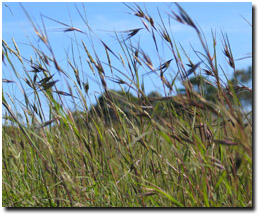Eco-rich Grazing
Project Team | Research | Project Location | Publications | Photos | Related Links
Grazing for Biodiversity and Profit
The Ecologically Sustainable Agriculture Initiative (ESAI) Grazing for Biodiversity and Profit project is a joint initiative between the Department of Sustainability and Environment and the Department of Primary Industries. The four year project (2001-2005) aims to achieve a more socially and environmentally acceptable balance between biodiversity and agricultural productivity in native grasslands that remain on Victorian farms and provide farmer and other land managers with current knowledge and skills to manage their native grasslands.
 Themeda triandra, Kangaroo Grass on the Volcanic Plain | Victoria’s grassy communities have been severely altered through 150 years or more of grazing and cultivation. A dramatic decrease in plant and animal diversity and a subsequent shift in plant species dominance from tall warm season native perennials such as Kangaroo Grass (Themeda triandra), to shorter cool season native perennials (e.g. Austrodanthonia spp.) and exotic annual and perennial grasses (e.g. Vulpia spp. & Phalaris spp.) is clearly evident. A loss of ecosystem stability in the form of fluctuating water tables, salinity, erosion and exotic species invasion has also been recorded and is considered a serious threat to landscape ecosystem function. The project involves social, economic and ecological research, with experimental sites located across the Volcanic Plains of Western Victoria and the Northern Riverine Plains. |
The field component of the Volcanic Plains study aims to examine the role that timing and duration of ‘resting’ from stock grazing has on native and exotic plant cover, diversity and habitat structure. Evidence suggests that the exclusion of grazing at particular times of the year may promote an increase or decrease in the abundance of particular groups of species.
The study on the Northern Riverine Plains aims to examine the establishment of bluebush and saltbush when sown alone or under a wheat crop, with a view to hastening the return of these perennial species into the annual-dominated pasture after cropping.
A New Direction
In 2005 DSE, Plains Tender and Grain & Graze came together and jointly funded the short-term continuation of the experimental trials on the Volcanic Plains.
The Arthur Rylah Institute (DSE) is also working closely with PlainsTender to monitor some of the properties with native grasslands currently under the PlainsTender scheme. PlainsTender is a scheme on the Victorian Volcanic Plains that offers monetary incentives for landholders to improve their native vegetation. It is unique in that landholders establish their own price for the management services they are willing to undertake, and enter this as a ‘bid’. All bids are assessed with those deemed successful offering the best value for money. Please see the Corangamite CMA website for more detail.
A project fact sheet can be downloaded for additional information.
Contacts
If you are interested in the outcomes of this project please contact:
| Jaimie Mavromihalis DSE/ARI Heidelberg Ph: (03) 94508638 Email: Jaimie Mavromihalis | Steve Clark (Project Leader) DPI Hamilton Ph: (03) 55730977 Email: Steve Clark |


